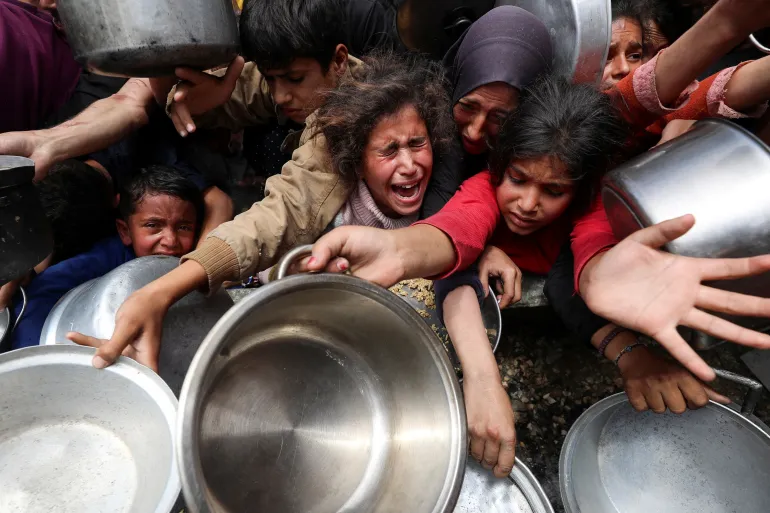“Free Palestine” Is Not Hate Speech

“The most potent weapon in the hands of the oppressor is the mind of the oppressed.”
— Steve Biko
Refusing Silence
The phrase “Free Palestine” has become a symbolic flashpoint in global discourse on justice, occupation, and identity. Its meaning is far from fixed. To some, it represents a demand for Palestinian sovereignty, autonomy, and dignity. To others, it evokes fears of national destruction and collective trauma. These varying interpretations stem from deeply entrenched historical narratives, geopolitical interests, and divergent frameworks of morality and memory.
But here’s the truth that needs to be spoken clearly: saying “Free Palestine” is not antisemitic. It is a call for justice in the face of what leading genocide scholars now unanimously agree constitutes genocide. Those who label it as antisemitism are weaponizing language to silence legitimate criticism and shield ongoing atrocities from accountability.

Zionism and Judaism: Understanding the Distinction
Zionism arose in 19th-century Europe during a time of rising nationalism and entrenched antisemitism. Crucially, it did not emerge from the religious traditions of Judaism but from secular Jewish thinkers who sought a nationalist solution to Jewish persecution.
Theodor Herzl, author of Der Judenstaat, advocated for a Jewish state not rooted in spiritual return but in political pragmatism. The First Zionist Congress in 1897 was more a product of European political philosophy than of Jewish religious scholarship. Herzl considered alternative sites for this state, including Uganda and Argentina, before the movement settled on Palestine due to its historical and symbolic significance.
This nationalist turn was not embraced by all Jews. Orthodox communities such as the Neturei Karta denounced Zionism as a heretical deviation from Jewish law, which traditionally held that the return to Zion would be divinely orchestrated. Bundists and other Jewish socialists rejected Zionism for its ethno-nationalist aspirations, instead favoring diasporic solidarity and labor internationalism.
Even some early Zionists acknowledged the dangers of implementing a state over an already inhabited land. Internal memoranda from figures like Ben-Gurion recognized that a binational state with equal rights would undermine the Zionist objective of establishing Jewish demographic and political dominance.
European Jewish settlers began establishing colonies in Ottoman Palestine decades before the creation of Israel. These colonies, often financed by wealthy donors like Baron Rothschild, followed exclusionary policies that prioritized Hebrew-only labor and the displacement of Palestinian tenant farmers. Such policies were essential to the Zionist strategy. The contradiction between the humanitarian justification for Jewish statehood and the exclusionary practices on the ground remains a core tension that has never been reconciled.
The British Empire’s Role in Engineering Catastrophe
The modern Israeli-Palestinian conflict cannot be understood without recognizing the decisive role of the British Empire. During World War I, Britain promised conflicting outcomes to different parties: support for an independent Arab kingdom in exchange for revolt against the Ottomans, colonial partition with France in the Sykes-Picot Agreement, and a national home for Jews in Palestine via the Balfour Declaration of 1917. These promises were deliberately designed to maximize imperial leverage and prevent unified opposition in the region.

The British Mandate period (1920–1948) institutionalized the asymmetry between Jewish settlers and the indigenous Arab population. Jewish immigration, land acquisition, and political organization were supported, while Palestinian political aspirations were curtailed.
British authorities responded to Palestinian revolts with brutal counterinsurgency measures, home demolitions, curfews, and mass imprisonment without trial, that would later be replicated by Israeli security forces. Britain’s refusal to implement democratic institutions or adjudicate land disputes equitably exacerbated tensions and ensured no peaceful solution would be in place by the time of their withdrawal.
When Britain left Palestine in 1948, it did so without establishing a framework for coexistence. The resulting vacuum facilitated civil war, the displacement of over 700,000 Palestinians, and the unilateral declaration of the State of Israel. British colonialism did not simply mismanage Palestine. It actively manufactured the conditions for its fragmentation.
Two States, One Myth
The idea that Palestinians have consistently rejected peaceful coexistence through a two-state solution is frequently cited in pro-Israel discourse. This argument is reductive and historically misleading. The 1947 United Nations Partition Plan awarded a Jewish state 55 percent of Palestine, even though Jews constituted roughly one-third of the population and owned less than 10 percent of the land. Palestinians and surrounding Arab nations saw the plan as a form of settler colonialism imposed through international fiat.
Subsequent negotiations, including the Camp David Summit and the Oslo Accords, were heralded as breakthroughs but ultimately maintained Israeli supremacy over Palestinian territories. Oslo’s framework carved the West Bank into a patchwork of administrative zones that facilitated Israeli control over mobility, resources, and infrastructure. The Palestinian Authority became a subcontractor of occupation rather than an embryonic state. Israel continued building settlements throughout the process, violating both the spirit and the letter of the agreements.
The repeated claim that Palestinians walked away from generous offers elides the reality that these “offers” excluded control over borders, denied the right of return for refugees, and entrenched a fragmented geography designed to be nonviable. Accepting these terms would not have constituted independence. It would have enshrined apartheid under the language of peace.
Genocide Unfolding in Real Time
Today, scholars such as Rashid Khalidi and Nur Masalha have meticulously documented the erasure of Palestinian villages, the use of legal fictions to justify land theft, and the racialized logics that cast indigenous Palestinians as “non-modern.” This logic is now on full display through collective punishment, bombings of refugee camps, and the weaponization of humanitarian aid, all features of what genocide scholar Dr. Raz Segal, an Israeli academic, describes as a “textbook case of genocide unfolding in real time.”

What the International Court of Justice Found
In January 2024, the International Court of Justice issued a groundbreaking ruling finding it “plausible” that Israel is committing genocide against Palestinians in Gaza. The court issued legally binding provisional measures requiring Israel to:
- Prevent genocidal acts
- Ensure its military does not commit genocide
- Prevent and punish incitement to genocide
- Enable provision of basic services and humanitarian aid
- Preserve evidence
- Report back within one month
Multiple countries have since joined South Africa’s case, including Brazil, Ireland, Bolivia, and Belize, while the court has issued additional orders including measures regarding Rafah operations.
Israel’s Defiance of International Law
Rather than compliance, the evidence shows deliberate defiance. Human Rights Watch documented that aid deliveries actually decreased after the ICJ ruling: from 147 trucks daily before the ruling to just 93 trucks afterward, and only 57 trucks between February 9-21, 2024. Over 3,500 Palestinians were killed in the month following the court order to prevent genocide. Al Jazeera’s analysis found extensive evidence of continued violations including targeting of Rafah and ongoing restrictions on humanitarian aid.

Amnesty International found that “Israel has failed to take even the bare minimum steps to comply” with the ICJ’s binding orders, continuing to restrict essential supplies while humanitarian workers described “frequent, unpredictable and ‘arbitrary’ rejections” of aid deliveries.
Unanimous Expert Consensus
A Dutch investigation by NRC newspaper revealed that leading genocide scholars from six countries are “surprisingly unanimous” that Israel’s actions constitute genocide. As Israeli genocide researcher Raz Segal told NRC: “Can I name someone whose work I respect who doesn’t consider it genocide? No, there is no counterargument that takes into account all the evidence.”
Professor Uğur Ümit Üngör of the University of Amsterdam added: “I don’t know them”—referring to respected genocide scholars who disagree with the assessment. The investigation found that “even cautious voices have changed” their assessment as evidence mounted.
Over 55 scholars of Holocaust, genocide, and mass violence have signed statements warning of genocide in Gaza, noting that the death toll has reached over 53,000 Palestinians, including more than 15,000 children.
Weaponizing Antisemitism: A History of Linguistic Suppression
Conflating anti-Zionism with antisemitism transforms legitimate political criticism into ethnic hatred, creating a categorically false equation with devastating real-world consequences. Zionism, particularly in its ethno-nationalist, expansionist form, is a political ideology, not a religion. This distinction goes beyond semantics. It is crucial.
The conflation of anti-Zionism with antisemitism traces back to Israeli Foreign Minister Abba Eban in the 1970s, who declared “the distinction between anti-Semitism and anti-Zionism is not a distinction at all.”
The IHRA Definition’s Problematic Impact
The International Holocaust Remembrance Alliance (IHRA) definition of antisemitism, widely adopted in Western institutions, includes examples that dangerously collapse anti-Zionism and antisemitism. Numerous Jewish scholars, including those from Jewish Voice for Peace and the International Jewish Anti-Zionist Network, have condemned the IHRA definition as a tool for silencing legitimate political speech.
Research has documented how the IHRA definition “serves as a counterinsurgency tool aimed at shielding Israel from resistance to its oppressive form of racial governance.” It has been used to stifle campus protests, punish academic inquiry, and criminalize expressions of solidarity with Palestinians.
Jewish Voices Against Conflation
As Israeli historian Ilan Pappé writes, “Criticizing Zionism is not antisemitic any more than criticizing theocracies is anti-religious.” The Jerusalem Declaration on Antisemitism, drafted by over 200 Jewish studies scholars, explicitly states that supporting arrangements for full equality “between the river and the sea, whether in two states, a binational state, unitary democratic state, federal state, or in whatever form” is not inherently antisemitic.

The vast and growing chorus of Jewish voices opposing Israeli state violence, ranging from Holocaust survivors like Hedy Epstein to today’s young organizers in IfNotNow, demonstrates that Jewish identity is not monolithic, and that solidarity with Palestinians is not a betrayal of Jewish values but an affirmation of shared humanity.
The Cost of Speaking Truth
Targeting Jewish Scholars
The weaponization of antisemitism accusations has had real consequences for those speaking out. Raz Segal, the Israeli genocide scholar, reports being “regularly accused of antisemitism” for his expert analysis. His genocide assessment even led to the cancellation of a job offer from the University of Minnesota’s Center for Holocaust and Genocide Studies due to pressure campaigns.
A German expert in the field, speaking anonymously, called the subject “poisoned” in their country, saying scholars are immediately labeled antisemitic if they mention “possible genocide.” The expert noted that if these same acts were committed by a country other than Israel, “all Germans would immediately sound the alarm and speak of genocidal violence.”
Unlearning the Propaganda
Many former Zionists and Western citizens raised in pro-Israel frameworks describe their political awakening as a painful process of unlearning. Miko Peled, son of an Israeli general, wrote in his memoir The General’s Son about discovering the “layers of lies” that shaped his early beliefs, confronting the “cognitive dissonance of a liberal education that celebrated human rights while justifying apartheid.”
Israeli journalist Gideon Levy has publicly documented how education, media, and military institutions embed propaganda: “We are brainwashed. From childhood, we learn to fear Arabs, to see Palestinians not as fellow humans but as threats.” This process of dehumanization is central to any genocidal system.
The Politics of Language and Liberation
The term “terrorist” is itself a loaded and racialized term, frequently used to delegitimize liberation movements while masking the terror of state violence. Martin Luther King Jr. was labeled a communist. Nelson Mandela was on the U.S. terror watchlist until 2008. Israeli officials have branded Palestinians ‘human animals,’ employing language that constitutes incitement to destruction under the genocide convention.
When Western governments criminalize chants of “from the river to the sea” or ban Palestinian flags, they are not protecting Jewish communities from hate. They are protecting an apartheid regime from global accountability.
Historical Accountability and the Ethics of Justice
Understanding what “Free Palestine” means requires more than deciphering slogans. It requires historical accountability. The origins of the crisis lie in British imperial duplicity, Zionist settler expansion, and a global diplomatic system that privileges stability over justice.
For Palestinians, freedom means an end to occupation, forced displacement, and statelessness. For many Israelis, the phrase conjures fear of erasure. These perspectives are not symmetrical. One group holds sovereignty, nuclear weapons, and international recognition. The other holds expired IDs, demolished homes, and exile.
We cannot build justice on misrecognition. The two-state solution, as historically pursued, was not a genuine attempt at partition but a managerial strategy to contain Palestinian aspirations. The international community’s unwillingness to challenge Israeli impunity has rendered the model functionally obsolete.

Refusing to Be Silenced
Supporting Palestinian liberation is not antisemitic. It is antiracist. It is anti-genocide. It is anti-apartheid. It is a moral, legal, and political imperative backed by international law and expert consensus.
The attempt to silence this movement through weaponized definitions of hate speech is not only intellectually dishonest, it is dangerous. We must reject frameworks that frame decolonial resistance as terrorism and refuse narratives that erase Palestinian humanity in the name of “security.”
The world cannot afford to be neutral. Neutrality, as Desmond Tutu reminded us, favors the oppressor. The growing international consensus, from the ICJ’s “plausible genocide” finding to the unanimous agreement among genocide scholars, makes clear that what is happening in Gaza meets the legal definition of genocide.
“Free Palestine” is not a threat to Jews or anyone else. It is a demand for the right to live, backed by international law, expert analysis, and basic human decency. Those who label it antisemitic are the ones weaponizing language to shield ongoing atrocities from accountability.
The time for silence is over. The evidence is clear. The law is clear. The moral imperative is clear.
Free Palestine.

